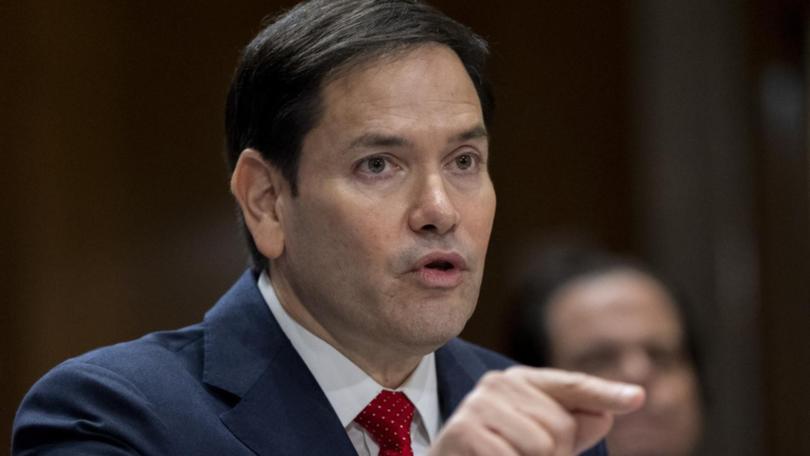Marco Rubio: Donald Trump's pick for secretary of state puts lens on China and says 'world in chaos'
Senator Marco Rubio, set to be the next US Secretary of State has told a hearing the 'world is in chaos', and warned against US dependency on China.

US Senator Marco Rubio, President-elect Donald Trump’s choice for secretary of state, has warned that the US must change course to avoid becoming more reliant on China, as he promised a robust foreign policy focused on American interests.
The remarks from the Republican senator, who is expected to comfortably win confirmation as the nation’s top diplomat, sent a stark message about changes in US policy.
Rubio, 53, addressed major international issues in a hearing before a committee where he has served for 14 years. He said an end to the war in Ukraine was essential with both sides having to make concessions, but spoke most strongly about the need to confront China.
Sign up to The Nightly's newsletters.
Get the first look at the digital newspaper, curated daily stories and breaking headlines delivered to your inbox.
By continuing you agree to our Terms and Privacy Policy.Rubio’s nomination is expected to be confirmed by the full Senate as soon as January 20, the day Trump is inaugurated for a second term.
The senator said confronting China would involve building US domestic industrial capacity.
“If we stay on the road we’re on right now, in less than 10 years, virtually everything that matters to us in life will depend on whether China will allow us to have it or not. Everything from the blood pressure medicine we take, to what movies we get to watch, and everything in between, we will depend on China for it,” Rubio said.
“That’s an unacceptable outcome.”
The outgoing Biden administration has taken measures to block China’s access to semiconductor technology and kept in place some policies toward China from Trump’s first term, but Trump has said he will impose many more tariffs on Chinese goods.
Rubio has long been one of Congress’ leading advocates for stronger China policy. His support for Hong Kong democracy protesters earned him Chinese sanctions in 2020, meaning he could be the first secretary of state under active Chinese travel restrictions.
He also said Washington must help the self-governing island of Taiwan with its so-called porcupine strategy to discourage an invasion by making it harder for China to attack.
Unless Washington makes “dramatic” changes, Rubio said, it would have to deal with the prospect of a “cataclysmic military intervention” in the Indo-Pacific before the end of the decade.
In his opening statement, Rubio said he saw a world in chaos where it will not be easy to restore order.
“It will be impossible without a strong and a confident America that engages in the world, putting our core national interests once again above all else,” Rubio said.
The son of immigrants from Cuba, Rubio would be the first person of Hispanic origin serving as the top US diplomat.
He also said strong US backing for Israel would continue. “I’m confident in saying that President Trump’s administration will continue to be perhaps the most pro-Israel administration in American history,” he told the senators, who learned about the Gaza ceasefire deal during the five-hour hearing.
Senators from both parties praised his nomination.
“You’ve earned yourself one of the hardest jobs in America. But after serving with you for so many years, I’m confident you are the right person. We need to take on these threats,” said Senator Jim Risch, the committee’s Republican chairman.
“I believe you have the skills and are well qualified to serve as Secretary of State,” Senator Jeanne Shaheen, the top foreign relations Democrat, said.
Some core Trump supporters had seen Rubio as out of step with Trump’s “America First” approach to government. Rubio was a Trump rival in the race for the 2016 Republican presidential nomination.
But his views recently have aligned more closely with the party leader’s.
Rubio’s friendly hearing contrasted sharply with the grilling of some other Trump nominees, such as former Fox News host Pete Hegseth, whose confirmation hearing on Tuesday focused on culture war issues, not international policy.
The Senate is evaluating a wave of cabinet picks ahead of Trump’s return to office on Monday including Trump’s choice for attorney general, Pam Bondi, and CIA director, John Ratcliffe.
At her confirmation hearing, Bondi vowed to end the “partisan weaponisation” of the US justice system, echoing Trump’s assertion that the prosecutions he faced were politically motivated.
She did not rule out investigations of Trump critics, including Special Counsel Jack Smith. But she also promised not to target people based on their politics.
Democrats also questioned whether Ratcliffe would use intelligence for political ends as head of the CIA. He said he would not force out employees for their political views.
Republicans shrugged off concerns about Trump’s influence, urging his nominees instead to root out those who might oppose Trump’s agenda.
